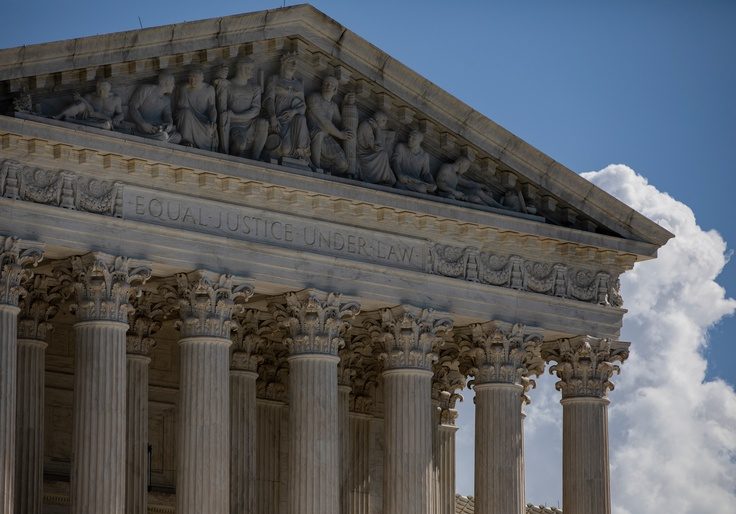In its latest foray into the war on drugs, the Supreme Court on Tuesday seemed ready to say that low-level crack cocaine offenders do not qualify for reduced sentences under a bipartisan criminal justice reform law.
The 2018 First Step Act made some drug offenders eligible for resentencing, but four federal courts and the Trump administration said its benefits don't extend to people convicted for possessing small quantities of crack cocaine. Tarahrick Terry, the defendant in Tuesday's case, was convicted for possessing a few grams of crack in 2008 and is seeking a lighter sentence for himself and others like him, but the Court seemed to be against him by a lopsided margin.
The case speaks to President Joe Biden's erratic history on drug enforcement issues. As a lawmaker, Biden was a prime mover behind the mandatory crack cocaine sentences the First Step Act rectified. But Biden's Justice Department is backing the offenders in Tuesday's case. The outcome could mean the difference between years in prison for hundreds in federal custody, about 80 percent of whom are black.
The Justice Department initially argued that the First Step Act didn't provide relief for low-level crack offenders. Biden appointees at the Justice Department reversed course and told the High Court on March 15 that they would flip positions to support the low-level offenders. The reversal, coming about one month before the argument, forced the Court to rearrange its calendar and seemed to trouble some of the justices.
A ruling against the defendants, which seemed likely, would put the Court on the other side of a large, bipartisan coalition. Terry is drawing support from lawmakers in both parties. Senate Majority Whip Dick Durbin (D., Ill.) and Sen. Chuck Grassley (R., Iowa) filed a brief supporting Terry, as did conservative and progressive advocacy groups like the American Conservative Union and the ACLU.
Congress passed the Fair Sentencing Act in 2010 to reduce the disparity between mandatory sentences for crack cocaine and powder cocaine possession. Before the Fair Sentencing Act became law, a person possessing five grams of crack cocaine was sentenced the same as a person possessing 500 grams of powder cocaine. Over time, a bipartisan consensus developed that the 100:1 crack-powder ratio was inappropriate.
"Enforcement of the crack-powder differential led to vast racial disparities, as crack cocaine defendants were disproportionately black, while powder cocaine defendants were not," ACLU lawyers told the justices in legal papers.
Under the Fair Sentencing Act, a mandatory 5-year sentence kicked in at 28 grams instead of 5 and a 10-year sentence applied for 280 grams instead of 50. Then in 2018, Congress passed the First Step Act, which said those changes would also apply to inmates sentenced before 2010.
About 2,400 defendants were resentenced in the year after the First Step Act became law, according to the U.S. Sentencing Commission. The average sentencing reduction was about six years.
Terry, the defendant, pled guilty in 2008 to possessing 3.9 grams of crack. He was sentenced to 16 years because he is a career criminal. Eligibility for a new sentence under the First Step Act turns on whether penalties for the underlying offense were modified by the Fair Sentencing Act. The Fair Sentencing Act said nothing directly about offenders convicted of possessing less than five grams.
Nonetheless, Terry's lawyers argue he's entitled to a new sentence because a judge will be more lenient this time around. At 3.9 grams, he was close enough to the five-gram mandatory minimum to get a stiff sentence. Now that the minimum kicks in at 28 grams, he believes his sentence will be lighter.
Terry's lawyers also said it would be curious for Congress to give sentencing relief to high-level distributors while leaving street-level dealers to rot in jail.
"[A] contrary interpretation would make little sense. It would cover kilogram trafficking kingpins but exclude the lowest-level dealers," said Andrew Adler, Terry's lawyer.
Those arguments didn't make much headway with the justices. Justice Elena Kagan told Adler many criminal statutes work in a similarly broad fashion, creating winners and losers.
"The reason why some ... are getting the benefit of it is because the statute works categorically. And there's nothing mysterious about that," Kagan said.
Justice Stephen Breyer said he sympathized with inmates like Terry, but the wording of the 2010 and 2018 laws seemed to be against them.
"I'd love to get out of it. I mean, I think [the sentences] were much too high. I understand that," Breyer told Adler. "But I can't get away from this statute."
Justice Neil Gorsuch, a sometime ally of criminal defendants, asked no questions.
A decision in the case, No. 20-5904 Terry v. United States, is expected by the summer.
